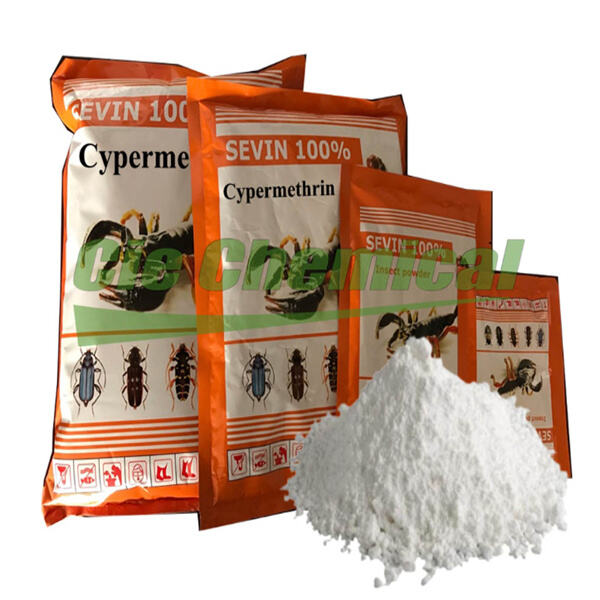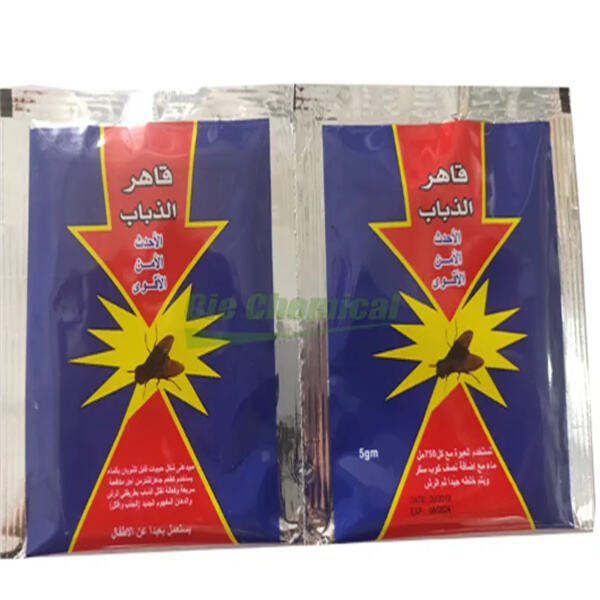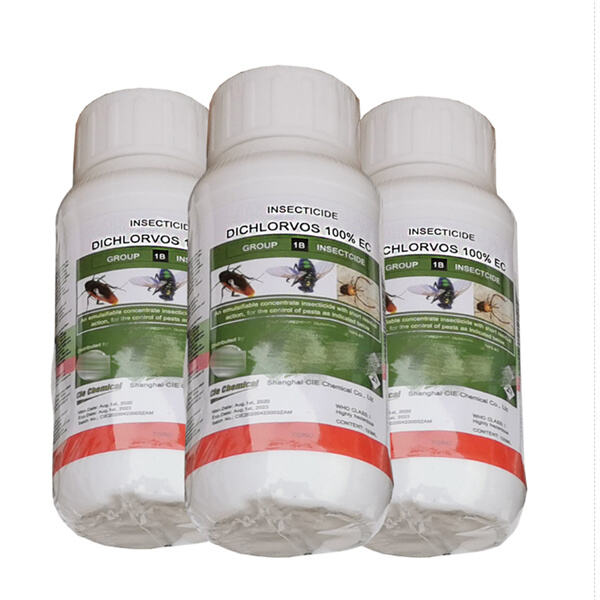ومع ذلك، يعمل المزارعون بلا كلل لحفظ صحة النباتات وضمان نموها بشكل قوي. يضعون ساعات وجهد لضمان أن الطعام يمكن أن يأتي من محاصيلهم. ومع ذلك، فإنهم ليسوا الوحيدين الذين يريدون أكل هذه النباتات؛ الحشرات أيضاً تريد أن تأكل! بعض الحشرات يمكن أن تكون ضارة للغاية وتفسد المحاصيل، مما يجعل الأمر صعباً على المزارعين لإنتاج كمية كافية من الغذاء التي يحتاجها البشر. يستخدم المزارعون أداة خاصة، وهي المبيدات الحشرية، لحماية محاصيلهم من هذه الحشرات الضارة. المبيدات الحشرية - بحكم التعريف، هي مواد كيميائية محددة تقتل أو تتحكم في الحشرات التي تضر بالمحاصيل. يجب على المزارعين القدرة على استخدام المبيدات الحشرية، لأن المحافظة على المحاصيل السليمة تنتج نباتات صحية وتضمن الغذاء لجميع الأشخاص الذين يحتاجون إليه.
هناك أنواع مختلفة من المبيدات الحشرية متوفرة للمزارعين؛ يعتمد النوع الذي يفضلون استخدامه على الحشرات التي تدمر نباتاتهم. يقومون بتطبيق بعض المبيدات الحشرية مباشرة على النباتات، بينما يتم إضافة أخرى إلى التربة حيث تنمو هذه النباتات. بعض المبيدات الحشرية مخصصة لحشرات معينة، في حين تستهدف الأخرى أنواعًا متعددة من الحشرات. أنواع المبيدات الحشرية المستخدمة في الزراعة هي المبيدات الحشرية بالتلامس، والمبيدات الحشرية النظامية، والمبيدات الحشرية المعوية. تعمل المبيدات الحشرية بالتلامس عن طريق قتل الحشرات بمجرد الاتصال بالمادة الكيميائية. أما المبيدات الحشرية النظامية فتُمتص بواسطة النبات عبر جذوره، وتؤثر من الداخل. تعمل المبيدات الحشرية المصممة على إغراق الحشرات عندما تتغذى على الأوراق أو السيقان لنوع معين من النبات.

اختيار المبيد الحشري للمحاصيل أمر حاسم للمزارعين. استخدام النوع المناسب يضمن أنه يعمل بشكل فعال ضد الحشرات المزعجة. كما يجب أن يكون المبيد غير سام للإنسان والبيئة. يجب على المزارعين الالتزام بدقة بالتعليمات الموجودة على ملصقات المبيدات. لا ينبغي للمستخدمين استخدامه قبل قراءة الملصق، ويمكن استخدامه وفقًا لما هو مذكور عليه فقط. يحصل المزارعون على معلومات أساسية من الملصق، بما في ذلك كمية المبيد التي يجب تطبيقها، وكيفية التكرار، وما هي الاحتياطات التي يجب اتباعها. التخزين الحكيم: يجب تخزين المبيدات الحشرية بعيدًا عن متناول الأطفال والحيوانات الأليفة. يجب على المزارعين استخدام المبيدات ثم التخلص منها كما هو موضح على الملصق.

لا تُعتبر المبيدات الحشرية بأي حال من الأحوال الحل الوحيد لمكافحة آفات المحاصيل، على الرغم من أنها قد تكون لا غنى عنها. لذلك يحاول العديد من المزارعين إيجاد بدائل أفضل بيئياً. أحد الطرق هو إدارة الآفات المتكاملة (IPM). يُعتبر IPM استراتيجية شاملة تدمج عدة طرق لمكافحة الآفات. مثل تدوير أنواع المحاصيل المزروعة، واستخدام أعداء الآفات الطبيعيين وتطبيق أفضل الممارسات الزراعية لمنع العودة المستمرة للحشرات. كما يأخذ IPM في الاعتبار تأثير مكافحة الآفات على البيئة والرفاهية البشرية. يمكن للمزارعين أيضاً استخدام المبيدات الحشرية الطبيعية. يتم صياغتها باستخدام مكونات آمنة مثل زيت النيم، رذاذ الثوم ورذاذ الصابون. إنها أقل خطورة ويمكن استخدامها في الزراعة الحيوانية وفي نفس الوقت، لا تؤثر على الناس أو البيئة.

هذا مفيد، ولكن إذا لم تُستخدم المبيدات الحشرية بعناية، يمكن أن تكون خطيرة على الإنسان والنظام البيئي أيضًا. ولذلك، يجب على المزارعين اتخاذ الحيطة المناسبة عند استخدام هذه المواد الكيميائية لضمان سلامتهم وسلامة الآخرين. من بين الخطوات الأكثر أهمية ارتداء الملابس الوقائية مثل القفازات والكمامات والنظارات. وعلى هذا النحو، فإنها تحميهم من أي أذى ناجم عن المواد الكيميائية. كما يجب على المزارعين عدم استخدام المبيدات الحشرية عندما يكون هناك ريح، لأن الرياح قد تؤدي إلى انتشار المواد الكيميائية وتعريض الأشخاص أو الحيوانات أو النباتات القريبة للأذى. بالإضافة إلى ذلك، يجب على المزارعين التأكد من تخزين جميع المبيدات الحشرية في مكان آمن بعيدًا عن الأطفال والحيوانات الأليفة. يجب على المزارعين التخلص من المبيدات الحشرية المتبقية وفقًا للإرشادات الموجودة على العبوة لأن ذلك مهم جدًا.
تتوافق منتجات المبيدات التي نبيعها مع اللوائح والمعايير الوطنية ذات الصلة. تضمن موثوقية واستقرار جودة المنتج. 1. استشارة ما قبل البيع: سنقدم للعملاء خدمات استشارية احترافية قبل البيع للإجابة على أسئلتهم حول الاستخدام، الجرعة، التخزين وغيرها من القضايا المتعلقة بالملابس والأدوية. يمكن للعملاء الحصول على مساعدتنا عبر الهاتف أو البريد الإلكتروني أو الاستشارة عبر الإنترنت قبل الشراء. 2. التدريب بعد البيع: سنقوم بتنظيم دورات تدريبية بشكل دوري لاستخدام المبيدات، بما في ذلك الاستخدام الصحيح للمبيدات، الاحتياطات، التدابير الوقائية وما إلى ذلك، لتحسين مهارات استخدام المبيدات ووعي السلامة لدى العملاء. 1/3 3. زيارات ما بعد البيع: سنقوم بإجراء زيارات دورية بعد البيع لعملائنا لمعرفة استخدامهم ورضاهم، جمع آرائهم واقتراحاتهم، وتحسين خدماتنا باستمرار.
تم تأسيس شركة شنغهاي سي آي إي الكيميائية المحدودة في 28 نوفمبر 2013. ركزت سي آي إي على تصدير المواد الكيميائية لمدة حوالي 30 عامًا. وفي الوقت نفسه، نحن ملتزمون بجلب المزيد من المنتجات الجيدة إلى المزيد من الدول. بالإضافة إلى ذلك، مصنعنا لديه طاقة إنتاج سنوية تبلغ حوالي 100,000 طن من الغليفسات وحوالي 5,000 طن من الأسيتوكلور. كما نتعاون أيضًا مع بعض الشركات متعددة الجنسيات لإنتاج البيراكونيت والإيميداكلوبريد. لذلك، جودتنا عالمية المستوى. حاليًا، يمكننا إنتاج أشكال جرعات تشمل SL، SC، OSC، OD، EC، EW، ULV، WDG، WSG، SG، G وغيرها. وفي الوقت نفسه، قسم البحث والتطوير لدينا ملتزم دائمًا بتطوير صيغ جديدة لإنتاج بعض المواد الكيميائية المركبة وفقًا لاحتياجات السوق. بهذه الطريقة، يمكن لفعالية منتجاتنا الجديدة أن تلبي احتياجات المستهلكين النهائيين حول العالم. نحن دائمًا نعتبرها مسؤوليتنا. بالإضافة إلى ذلك، حتى الآن، دعمنا تسجيل أكثر من 200 شركة في 30 دولة حول العالم. وفي الوقت نفسه، نقوم بتقديم تقارير GLP لبعض المنتجات.
في عالم CIE، ستجد تصنيعًا ممتازًا للأدوية الزراعية وخدمات تقنية لأننا نركز على الكيماويات واستكشاف منتجات جديدة للأشخاص حول العالم. في بداية القرن الحادي والعشرين، ركز مصنعنا فقط على العلامات التجارية الوطنية. بعد سنوات من التطوير، بدأنا في استكشاف الأسواق الدولية مثل الأرجنتين، البرازيل، سورينام، باراغواي، بيرو، إفريقيا، جنوب آسيا وغيرها. اعتبارًا من عام 2024، قدمنا خدماتنا وأقمنا علاقات تجارية مع شركاء من أكثر من 39 دولة. وفي الوقت نفسه، سنظل ملتزمين بجلب المزيد من المنتجات الجيدة إلى المزيد من الدول.
1. زيادة الإنتاج: يمكن للمبيدات الحشرية أن تتحكم بفعالية في الآفات والأمراض والآفات الضارة، مما يؤدي إلى تقليل مستويات الآفات، وزيادة الإنتاج، وضمان الأمن الغذائي. 2. توفير الجهد والوقت: استخدام المبيدات الحشرية يمكن أن يقلل من تكاليف الجهد والوقت على المزارعين ويعزز كفاءة الإنتاج الزراعي بشكل فعال. 3. ضمان الفوائد الاقتصادية: يمكن للمبيدات الحشرية أن تمنع الأمراض، وتضمن الحصاد، وأيضًا تحقق فوائد اقتصادية مذهلة في الإنتاج الزراعي. 4. ضمان سلامة وجودة الغذاء: يمكن للمبيدات الحشرية أن تضمن سلامة وجودة الحبوب والغذاء، وتتجنب الوقاية من حدوث الأوبئة وتحمي صحة الناس.